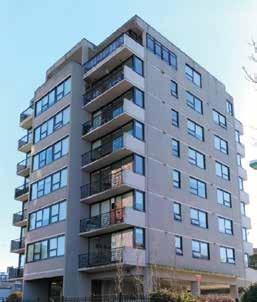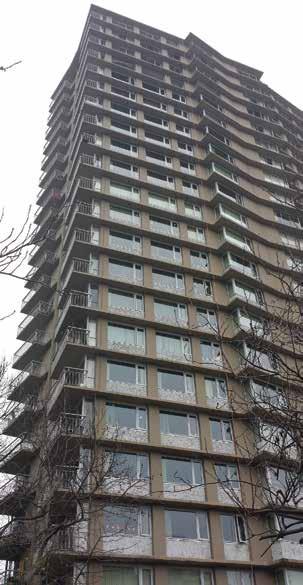
8 minute read
Residential Tenant Occupied Property
Risks to buyers and sellers
By Michael Drouillard, Lawyer, Harper Grey LLP
Advertisement
In the last several years, our province has implemented significant measures intended to protect tenants of residential housing. This legislation has inadvertently exposed another group of vulnerable consumers, buyers and sellers of residential housing, to risks never seen before in the context of the sale of residential property which is occupied by a residential tenant.
This article discusses the most common and significant sources of risk the author has started to see develop rapidly in B.C. since the recent legislative change. Additionally, this article provides suggestions about how to mitigate that risk until there is greater industry awareness about the issue, and further legislative reform.
In the typical residential real estate transaction, a buyer may wish to occupy the home in question on completion and the buyer’s real estate agent will draft a contract requesting vacant possession of the property at section 5 of the standard form real estate contract used in our province as follows:
5. POSSESSION: The Buyer will have vacant possession of the Property at [date and time]. (Possession Date) OR, subject to the following existing tenancies, if any: Vacant Possession
The Real Estate Council of B.C. also recommends real estate licensees use the following clause: Notice to Tenants Clause. The seller will give legal notice to the tenant to vacate the premises, but only if the seller receives the appropriate written request from the buyer to give such notice in accordance with the requirements of section 49 of the Residential Tenancy Act.
Typically, other than the above two clauses, nothing more is stated about the rights and responsibilities of the buyer and the seller in relation to the buyer’s request that the seller deliver vacant possession of the property.
Usually, it works out. In most cases, the tenant leaves in response to the notice to end tenancy, and vacant possession is delivered as requested by the buyer. However, there are a growing number of cases in which the tenant does not leave. Also, sometimes a buyer may back out of the contract for legitimate reasons after the notice has already ended the tenancy. These scenarios can result in substantial legal consequences for buyers and sellers.
RISKS TO SELLERS WHEN A TENANT FAILS TO LEAVE
Occasionally, after being served a notice, the tenant will dispute the notice to end tenancy. In some rare occasions the tenant will simply refuse to leave. This has become much more common since COVID-19 after the province implemented an emergency order which temporarily allowed tenants to ignore notices of this kind. This emergency order did not address the impact of that decision for buyers and sellers of real estate and may have caused many sellers across British Columbia to breach their contracts for reasons outside of their control.
If the tenant disputes the notice, or does not voluntarily leave, then this raises the following issues.
• Who pays for the cost of litigation with the tenant to compel the tenant to leave? The buyer who requested the notice be served in the first place or the seller who is the tenant’s current landlord?
o The current contractual language typically used does not address this issue, resulting in confusion about which party is supposed to deal with the litigation, which prejudices both buyers and sellers.
• If the tenant doesn’t leave on possession date, then can the buyer back out? The case law is mixed in this area, and there



RenovatoRs, dealeRs and building envelope pRofessionals Welcome
We manufacture and install complete, engineered window and patio door replacement packages
• Single family residences to multi-storey apartment buildings • High performance aluminum or vinyl frames • AAMA/WDMA/CSA 101/I.S.2/A440-08 and BC Energy Efficiency Act compliant
604-291-6751
Vancouver Island and the Okanagan 1-866-291-6751 www.retroteckwindow.ca
Legal (Cont’d) are examples of cases in which the court found it was a material term of the contract giving a buyer a right to terminate, and there are other cases in which the court found that the buyer still had to complete, and only had a right to sue in damages.
o The current contractual language typically used by buyers and sellers does nothing to address this issue.
The result of this uncertainty is that buyers are using the failure of the tenant to leave as an opportunity to substantially renegotiate the terms of a contract shortly before completion, using the threat of refusing to complete, in circumstances which could be unfair to the seller who has now become exposed to the risk that the transaction may not proceed.
RISKS TO BUYERS WHEN A TENANT FAILS TO LEAVE
One of the recent legislative changes made by the province was to impose a punitive award of 12 months’ rent in favour of the tenant when a tenant is evicted because the landlord or purchaser intends to use the property, and the property is then not used for that purpose. The author calls the award “punitive” because it may be in excess of the tenant’s actual damages and may result in a windfall to the tenant. The intention of this legislative change was to deter landlords from using this basis of eviction as a ruse to obtain vacant possession.
In particular, the legislation provides as follows:
Tenant’s compensation: section 49 notice 51 (2) Subject to subsection (3), the landlord or, if applicable, the purchaser who asked the landlord to give the notice must pay the tenant, in addition to the amount payable under subsection (1), an amount that is the equivalent of 12 times the monthly rent payable under the tenancy agreement if (a) steps have not been taken, within a reasonable period after the effective date of the notice, to accomplish the stated purpose for ending the tenancy, or (b) the rental unit is not used for that stated purpose for at least 6 months’ duration, beginning within a reasonable period after the effective date of the notice. (3) The director may excuse the landlord or, if applicable, the purchaser who asked the landlord to give the notice from paying the tenant the amount required under subsection (2) if, in the director’s opinion, extenuating circumstances prevented the landlord or the purchaser, as the case may be, from
(a) accomplishing, within a reasonable period after the effective date of the notice, the stated purpose for ending the tenancy, or (b) using the rental unit for that stated purpose for at least 6 months’ duration, beginning within a reasonable period after the effective date of the notice.
This provides that a buyer of a property, who asks an owner to evict a tenant on the basis that the buyer intends to move into the property, must pay the tenant 12 months’ rent as a penalty to the tenant if the buyer ends up not actually moving into the property after the tenant leaves in response to the notice. The buyer is excused from this obligation if there are “extenuating circumstances”. However, the meaning of that term is largely undefined by case precedent and by policy guidelines. Arbitration decisions of the Residential Tenancy Branch of B.C. are not binding or precedential either. The result is that the question of whether the circumstances are “extenuating” is unpredictable. This creates a source of significant risk for the buyer, as follows.
• What if the buyer backs out of the contract for an unrelated reason after all conditions are waived, but the tenant leaves in response to the eviction notice that was already served?
The buyer is prima facie liable to the tenant to pay 12 months’ rent, subject to the buyer showing extenuating circumstances.
An arbitrator may not agree that backing out of the contract necessarily constitutes extenuating circumstances. There is no case law, legislation, or policy guideline which gives any degree of certainty to the outcome.
• What if the buyer backs out of the contract on the basis that the tenant failed to leave on the possession date, and yet the only reason the tenant has not left is because the tenant has started a legal proceeding to set aside the notice the buyer asked be delivered?
• What if the buyer even included language in the contract to the effect that the contract is terminated if the premises are not vacant on possession? The tenant isn’t bound by that agreement, and so if the tenant leaves in response to the notice, the buyer is still responsible to pay 12 months’ rent, subject to an arbitrator agreeing the buyer is discharged due to extenuating circumstances.
As with the above examples for sellers, the current contractual language typically used by buyers and sellers does nothing to address these issues.
SUGGESTIONS MOVING FORWARD
Until standardized clauses dealing with these issues are created and used by the industry, legal counsel is necessary to draft language dealing with the issues described above when selling tenant occupied property. Dealing with these outcomes in a way that properly protects a party’s interests can be complex, since it involves drafting a contractual language which addresses multiple unpredictable outcomes, and so it requires the services of a lawyer.
Further legislative reform in this area is needed so that innocent buyers and sellers are not accidentally caught with liability that was intended for unscrupulous landlords and not for them. This could include, for example, legislative reform clarifying the meaning of “extenuating circumstances” that discharge a buyer from having to pay 12 months’ rent to a tenant, and consequences for tenants (and landlords) filing frivolous claims before the Residential Tenancy Branch of B.C. (currently there are very few consequences).
Michael Drouillard is vice chair of the board of directors of LandlordBC, and a practicing lawyer with Harper Grey LLP.

Commercial Sales & Leasing Property & Asset Management Strata Management
604.736.5611
Macdonald Commercial’s team of outstanding professionals are here to assist you with all of your apartment real estate needs

At Macdonald Commercial we’ve built our reputation by providing our clients with the very best in full service commercial real estate services - Sales, Leasing, Property Management, and Luxury Strata Management






